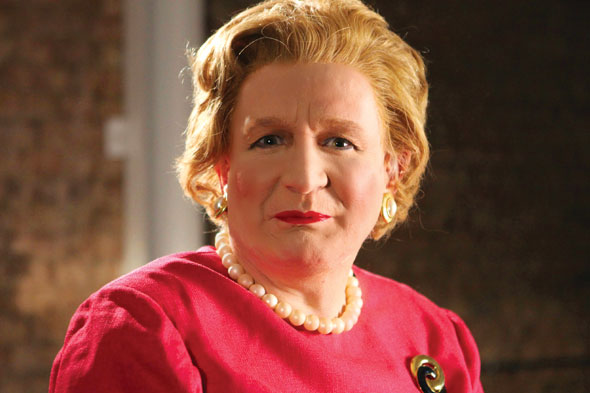Why i got a MAN to play Maggie
This was the welcome, but stressful, predicament I found myself in recently following the unexpectedly rapid trajectory of my debut play, Dead Sheep. I’d only finished writing at the end of last May, and while I was pleased with it, I certainly was not expecting it to be staged anywhere, any time soon.
But then it caught the eye of the Park Theatre in north London.
The play is about Geoffrey Howe, the ‘dead sheep’ of the title – one of his rivals famously likened his speaking style to that of the deceased mammal – and it explores the events and personalities that shaped Howe’s famous 1990 speech triggering Margaret Thatcher’s resignation.

As the second anniversary of her death approaches, the play seems to have come along at just the right moment. Indeed, by mid-June, my producer Denise Silvey and I were across the table from Jez Bond, the Park’s artistic director, discussing a deal. Theatre veteran Denise was astonished: the process of making it ‘from page to stage’, she said, usually takes years, not days.
This was certainly new territory for me. I’d spent 30 years as an investigative journalist for radio and television, so I hadn’t the first idea how to find a convincing, credible and reasonably priced Mrs T.
Even worse, there were already a plethora of excellent ‘Thatchers’ out there, against whom any newcomer would be judged. There was the excellent Lindsay Duncan, for example, who played her in the BBC Two drama Margaret; Fenella Woolgar, whose delightful take on her was the highlight of the play Handbagged; and, of course, Meryl Streep, who won an Oscar for her turn in The Iron Lady. And then, of course, there was the indefatigable original. As I say, a dilemma.
We quickly organised a so-called ‘reading’. This involved actors performing the play informally around my kitchen table. It was a way of roadtesting the material, but also a kind of audition. The seasoned stage, television and film actress playing Margaret was excellent. Problem solved? Sadly not. It’s not just the likes of Meryl Streep who have pre-existing commitments. In this case, it was a long, immovable theatre tour of Australia.
Fortunately, my one showbiz pal was on hand. Alistair McGowan, an excellent stage actor himself, had volunteered to listen to the reading and offered some advice during the postmortem.
‘This may sound mad,’ he said, ‘but don’t dismiss it straight away. Think about it.
‘You should seriously consider… Steve Nallon.’
‘Steve Nallon? Isn’t Steve a man?’ I replied (I’m not a top investigative journalist for nothing, you know).
In fact, Steve had provided the voice of Margaret for several years on the successful ITV puppet satire Spitting Image. But my first instinct was one of extreme caution. I knew Steve was a brilliant vocal mimic, but could he act, on stage, in front of an audience, as a woman?
‘Just give it a go,’ said Alistair. ‘You’ve nothing to lose.’
And so we organised a second reading, this time on stage at the Park Theatre, in front of an invited audience of 50, including patrons of the theatre, friends, friends of friends and anyone else we could lay our hands on.
Even before we started, I sensed we were on to a winner. Discussing the role with Steve, it became clear that he isn’t just familiar with Margaret; he has a PhD in Thatcherology. He knows more about her than she probably knew herself. He has read dozens of books, pored over hundreds of hours of footage and studied countless research papers on her. He knows what she wore to which opening of Parliament, what she said to EU President Jacques Delors in a private discussion in 1988 and, most crucially of all, how she said it.

As the audience for our onstage reading quickly discovered, Margaret’s 1981 voice sounded noticeably higher and more strident than her 1989 voice. They also found out that Margaret’s way of dealing with women she didn’t see eye to eye with (in particular, Elspeth Howe, Geoffrey’s wife) differed markedly from the uncharacteristically acquiescent style of communication she reserved for her ‘dashers’ – those handsome charmers such as Alan Clark, Jonathan Aitken and Cecil Parkinson.
We knew we’d nailed it from the moment Steve opened his mouth and uttered Margaret’s first line: ‘No. No! No!!’ Half the audience laughed, the other half gasped. He was mesmeric.
An hour-and-a-half later, after Steve had used his full panoply of skills – head tilts, pauses, inflections, looks, movements – we knew we’d ‘found our Maggie’. It was proper acting, not impersonation. It was more subtle, and therefore more powerful, than caricature.
Sitting in the bar afterwards, we realised that there was another reason why it had worked, too. Margaret Thatcher was famously referred to as ‘the best man in England’ by Ronald Reagan – and it felt uncannily right to have a man playing her, at least this once. She had got to the top, arguably, by outplaying the big men of politics at their own game. Steve had added a dramatic and appropriate twist to her character.
Only two issues remained. Did Steve have a six-month theatre tour of Australia inked into his diary, and would the critics – and audiences – be as impressed as we were?
The answer to the first question was, thankfully, no. As for the second, we shall see.
Dead Sheep is at the Park Theatre, London N4, from 1 April until 9 May: 020-7870 6876, www.parktheatre.co.uk



